Company Accounts | Accountancy - Issue of shares for cash in instalments | 12th Accountancy : Chapter 7 : Company Accounts
Chapter: 12th Accountancy : Chapter 7 : Company Accounts
Issue of shares for cash in instalments
Issue
of shares for cash in instalments
The share capital may be
received through instalments as below:
·
First instalment called application money
·
Second instalment called allotment money
·
Third instalment called first call money
·
The last instalment called final call money
After allotment,
whenever the need arises call can be made. Call is a demand by a company to the
shareholders holding partly paid up shares to pay further instalments towards
the purchase price of shares. There may be more than one call. These calls can
be differentiated by serial numbers such as first call, second call, third call
and so on. The last instalment will be the final call. The words ‘and final’
will also be added to the last call. Example, if third call is the final call,
it will be termed as ‘third and final call’.
Equity shares may be
issued for cash at par or at premium. When a company issues shares at a price
equal to the face value (nominal value), it is known as issue at par. When a
company issues shares at a price more than the face value, the shares are said
to be issued at premium. The excess is called as premium.
(i) When shares are issued for cash at par:
Following are the
journal entries to be passed:
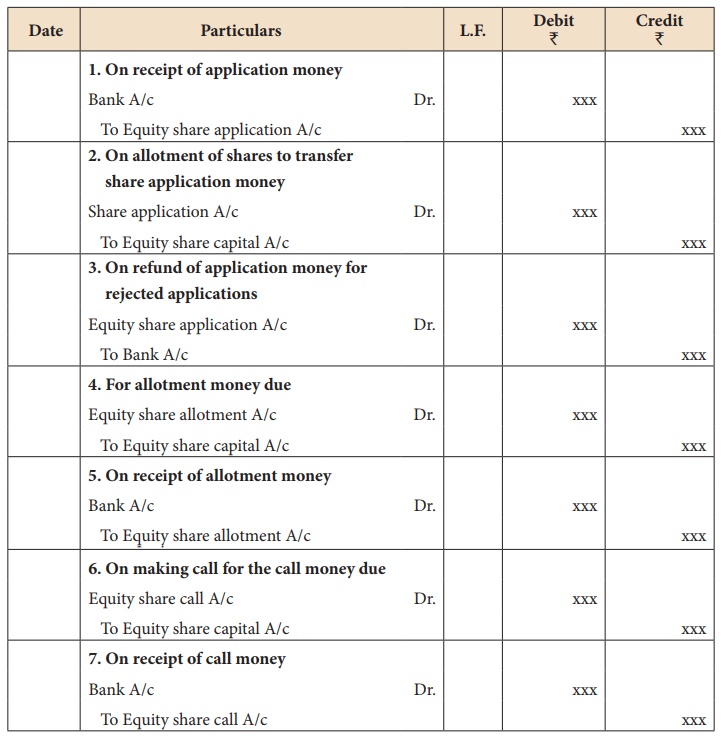
Illustration 1
Thai Ltd. issued
1,00,000 equity shares of ₹
10 each, payable ₹
5 on application, ₹
2 on allotment, 2 on first call and ₹
1 on final call. All the shares are subscribed and amount was duly received.
Pass journal entries.
Solution
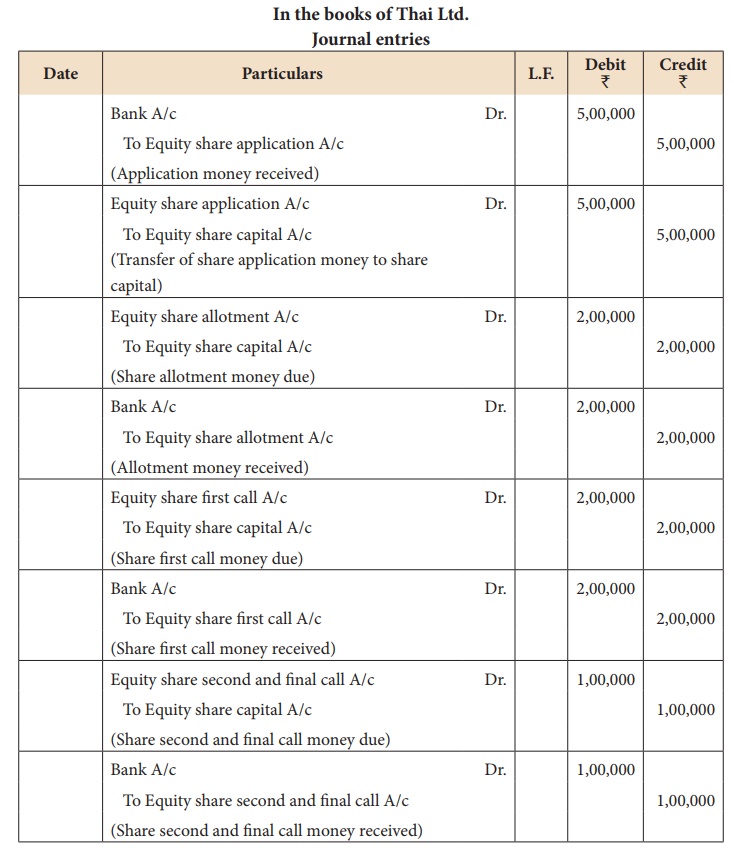
1. Under subscription
All the shares offered
to the public may not be subscribed in full. When the number of shares
subscribed is less than the number of shares offered, it is known as under
subscription. Under such circumstance, all those who have duly applied will
obtain allotment provided minimum subscription as mentioned in the prospectus
has been subscribed.
Illustration 2
Joy Company issued
10,000 equity shares at ₹
10 per share payable ₹
5 on application, ₹
3 on allotment and ₹
2 on first and final call. The public subscribed for 9,000 shares. The
directors allotted all the 9,000 shares and duly received the money. Pass the
necessary journal entries.
Solution
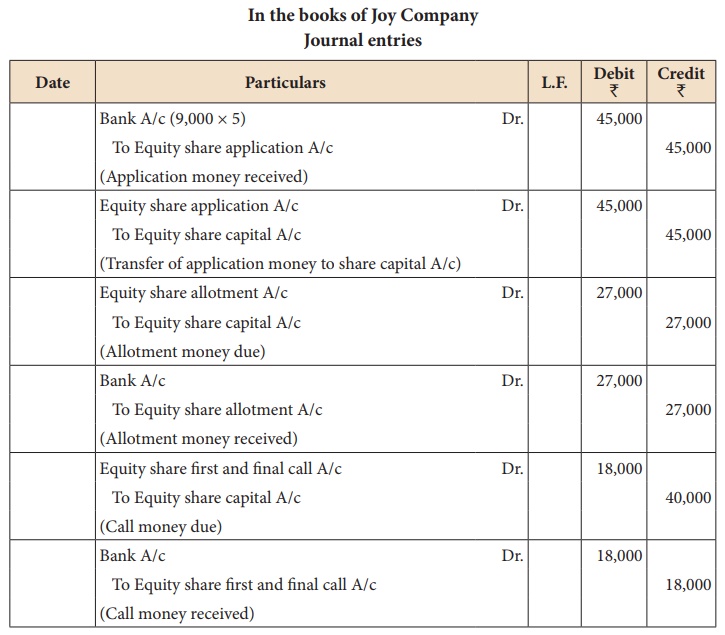
2. Over subscription
When the number of
shares applied for is more than the number of shares offered for subscription,
it is said to be over subscription. This situation can be dealt with as per any
of the following three alternatives:
a.
Some applications are accepted in full and others are totally
rejected. Application money is returned to the applicants for rejected
applications.
b.
All applications are allotted in proportion of shares applied for.
This is called pro rata allotment. Excess application money may be returned or
may be retained for adjustment towards allotment money and call money.
c.
A combination of the above two may be applied.
Illustration 3
Bharath Ltd. issued
1,00,000 equity shares of ₹
10 each to the public at par. The details of the amount payable on the shares
are as follows:
On application ₹
5 per share
On allotment ₹ 3 per
share
On first and final call ₹ 2 per share
Application money was
received for 1,20,000 shares. Excess application money was refunded
immediately. Pass journal entries to record the above.
Solution
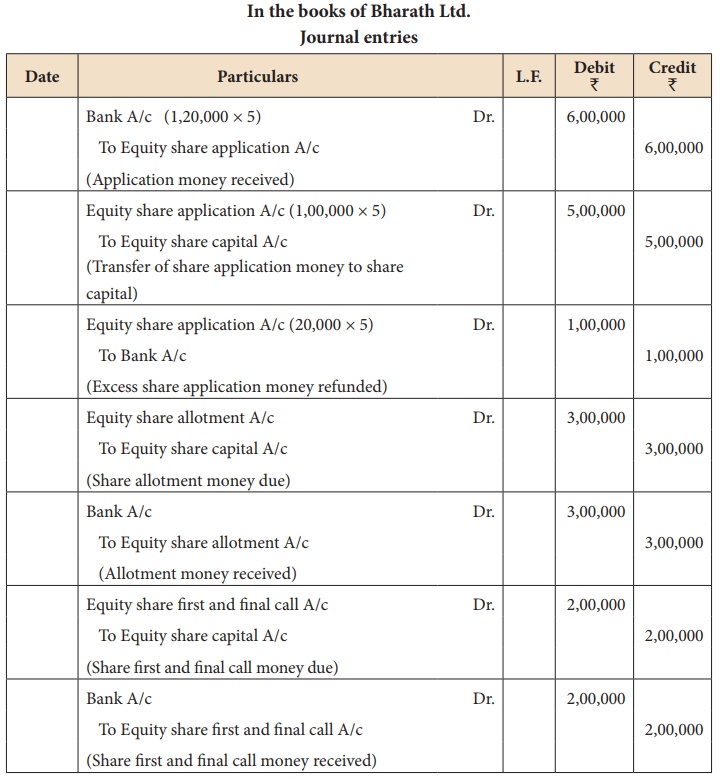
Illustration 4
Khan Ltd. issued 50,000
shares of ₹ 10 each to the public
payable ₹ 4 on application, ₹ 4 on allotment and ₹ 2 on first and final
call. Applications were received for 65,000 shares. The directors decided to
allot 50,000 shares on pro rata basis and surplus application money was
utilised for allotment. Pass journal entries assuming that the amounts due were
received.
Solution
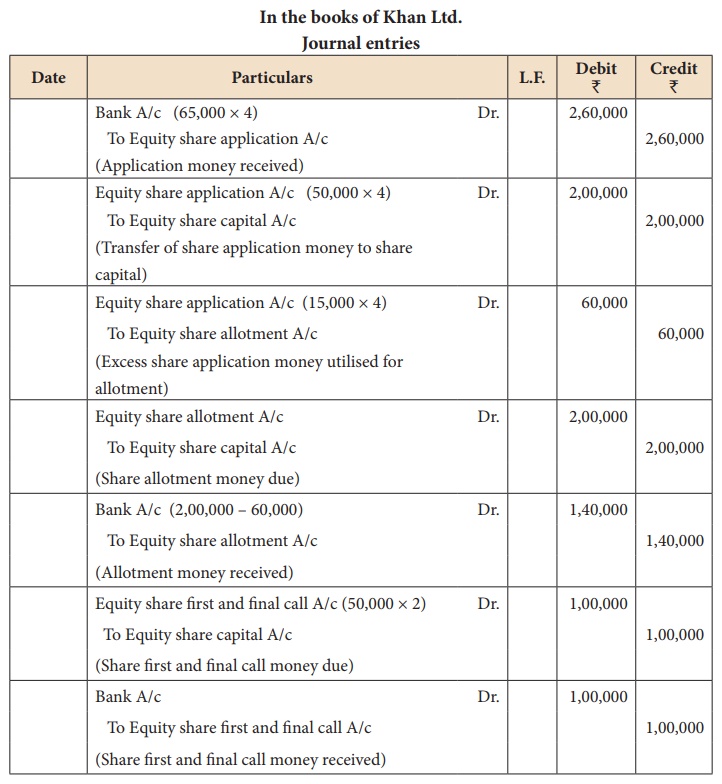
Illustration 5
Sudha Ltd. offered
1,00,000 shares of ₹
10 each to the public payable ₹
3 on application, ₹
4 on share allotment and the balance when required. Applications for 1,40,000
shares were received on which the directors allotted as:
Applicants for 60,000
shares - Full
Applicants for 75,000
shares - 40,000 shares (excess money will be utilised for allotment)
Applicants for 5,000
shares - Nil
All the money due was
received. Pass journal entries upto the receipt of allotment.
Solution
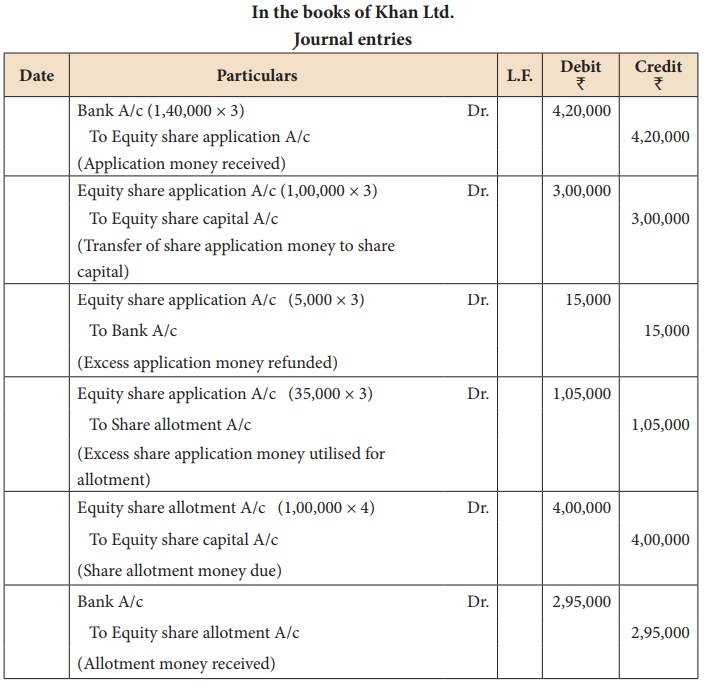
Working note:

3. Calls in advance
The excess amount paid
over the called up value of a share is known as calls in advance. It is the
excess money paid on application or allotment or calls. Such excess amount can
be returned or adjusted towards future payment. If the company decides to
adjust such amount towards future payment, the excess amount may also be
transferred to a separate account called calls in advance account.
Calls in advance does
not form part of the company’s share capital and no dividend is payable on such
amount. In the balance sheet, it should be shown under current liabilities.
As per Section 50 of the
Indian Companies Act, 2013, the company can accept calls in advance only if it
is authorised by its Articles of Association. As per Table F of the Indian
Companies Act, 2013, interest may be paid on calls in advance if Articles of
Association so provide not exceeding 12% per annum.
Tutorial note
The excess application
money on allotted shares after adjustment for allotment money should be
transferred to calls in advance account.
Following are the
journal entries to be passed:
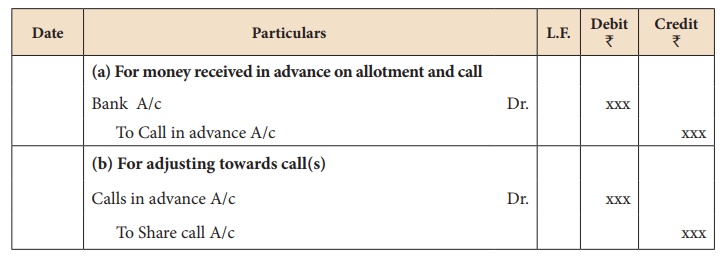
Illustration 6
Aruna Mills Ltd. with a
registered capital of ₹
5,00,000 in equity shares of ₹
10 each, issued 20,000 of such shares payable as follows; ₹ 4 per share on
application, ₹ 4 per share on
allotment and ₹ 2 per share on first
and final call. The issue was duly subscribed.
All the money payable
was duly received. But on allotment, one shareholder paid the entire balance on
his holding of 300 shares.
Give journal entries to
record the above.
Solution
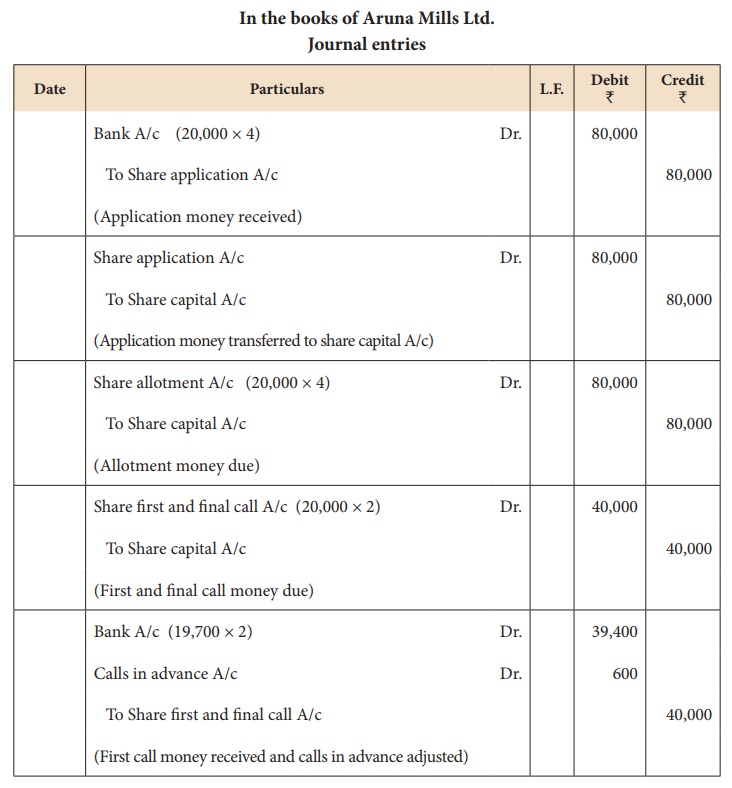
4. Calls in arrear
When a shareholder fails
to pay the amount due on allotment or on calls, the amount remaining unpaid is
known as calls in arrears. In other words, the amount called up but not paid is
calls in arrear.
As per Table F of the
Indian Companies Act, 2013, interest may be charged on calls in arrear if
Articles of Association so provide not exceeding 10% per annum. There are two
methods of accounting of calls in arrear.
(i) By not opening calls in arrear account
Under this method,
amount unpaid by the shareholders remains in the respective call account until
the amount is collected or the shares are forfeited.
(ii) By opening calls in arrear account
Under this method,
amount unpaid by the shareholders is transferred by debiting it to a separate
account called calls in arrear account. When calls in arrear is collected or
when the share is forfeited, the calls in arrear account is credited.
Illustration 7
Jeyam Tyres issued
15,000 ordinary shares of ₹
10 each payable as follows:
₹ 3 on application; ₹ 5 on allotment; ₹ 2 on first and final
call. All money were duly received except one shareholder holding 100 shares
failed to pay the call money. Pass the necessary journal entries for call
(using calls in arrear account).
Solution
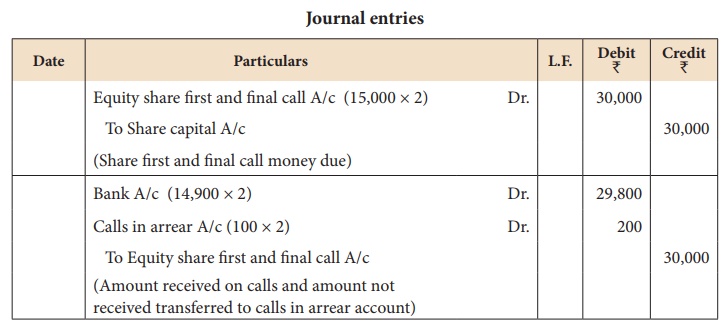
5. Forfeiture of shares
When a shareholder
defaults in making payment of allotment and/or call money, the shares may be
forfeited. On forfeiture, the share allotment is cancelled and to that extent,
share capital is reduced. The person ceases to be a shareholder of the company
after the shares are forfeited.
On forfeiture, the
amount so far paid by the shareholder is forfeited which is a gain to the
company and is credited to forfeited shares account. Forfeited shares account
is shown under share capital as a separate head in the Note to Accounts to the
balance sheet.
The following journal
entry is to be passed in the books of the company:

Illustration 8
Anitha was holding 500
equity shares of ₹
10 each of Thanjavur Motors Ltd, issued at par. She paid 3 on application, ₹ 5 on allotment but
could not pay the first and final call of ₹
2. The directors forfeited the shares for nonpayment of call money. Give
Journal entry for forfeiture of shares.
Solution

Illustration 9
Muthu was holding 20
equity shares of ₹
10 each on which he paid ₹
2 on application but could not pay ₹
3 on allotment and ₹
1 on first call. Directors forfeited the shares after the first call. Give
journal entry for recording the forfeiture of shares.
Solution

Tutorial note
Equity share capital is
debited with the called up amount of ₹
6.
6. Re-issue of forfeited shares
Shares forfeited can be
reissued by the company. The shares can be reissued at any price. But, the
reissue price cannot be less than the amount unpaid on forfeited shares.
Example: If a share of ₹ 10 on which ₹ 4 has already been paid
as application money is forfeited and reissued as fully paid up, then a minimum
of ₹ 6 must be fixed as the
new price (10 – 4
= 6). When forfeited shares are reissued at a loss,
such loss is to be debited to forfeited shares account. When forfeited shares
are reissued at a premium, the amount of such premium will be credited to
securities premium account. The following journal entries are passed on
reissue:
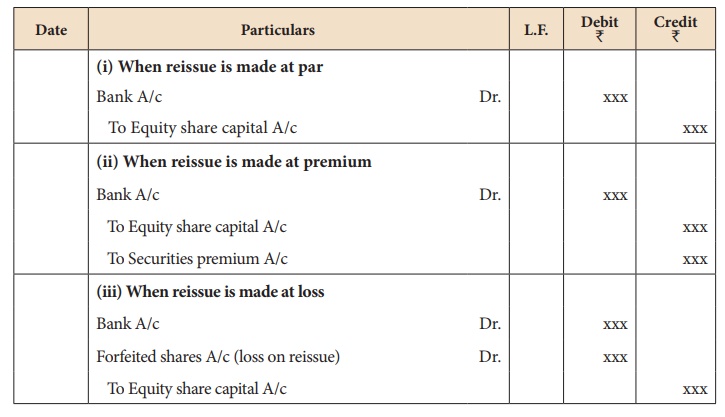
If the reissue price is
more than the amount unpaid on forfeited shares, it results in profit on
reissue which is treated as capital profit and is transferred to capital reserve
account. The following journal entry is passed:

When only a part of the
forfeited shares are reissued, the proportionate amount of profit on the shares
reissued should be transferred to capital reserve account. Proportionate amount
of profit is computed as follows:

The remaining amount in
the forfeited shares account is shown under share capital as a separate head
under share capital in the Note to Accounts to the balance sheet.
Illustration 10
Anu Company forfeited 200
equity shares of ₹
10 each issued at par held by Thiyagu for nonpayment of the final call of ₹ 3 per share. The shares
were reissued to Laxman at ₹
6 per share. Show the journal entries for forfeiture and reissue.
Solution
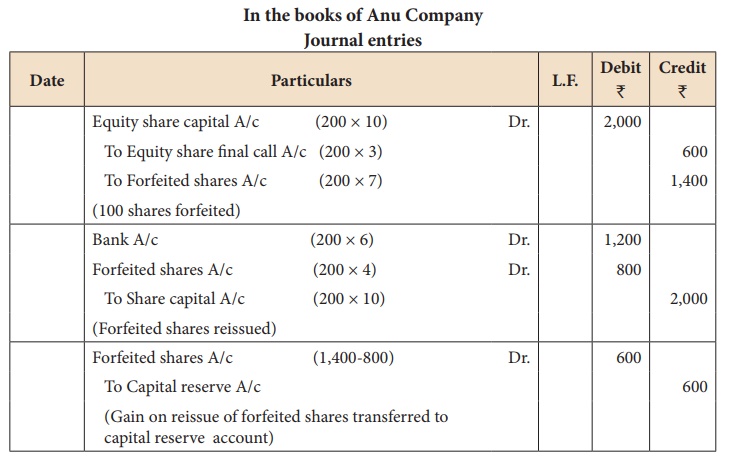
Illustration 11
Maruthu Ltd. forfeited
150 equity shares of ₹
10 each for non payment of final call of ₹
4 per share.
Of these 100 shares were
reissued @ ₹ 9 per share. Pass
journal entries for forfeiture and reissue.
Solution
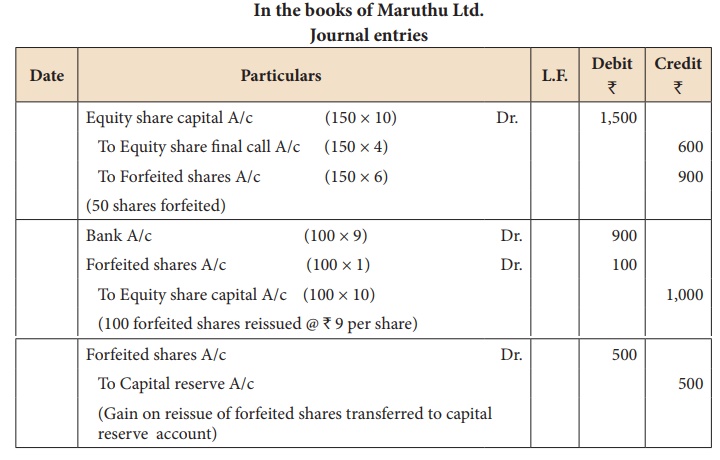
Working note:
Forfeited amount for 150
shares = ₹ 900
Forfeited amount for 100
shares = 900/150 x 100 =₹ 600
Gain or loss = Amount
forfeited– loss on reissue
= 600 – 100
Net gain = ₹ 500
Illustration 12
Gemini Ltd. forfeited 20 equity shares of ₹ 10 each, ₹ 7 called up, on which Mahesh had paid application and allotment money of ₹ 5 per share. Of these 15 shares were reissued to Naresh by receiving ₹ 6 per share paid up as ₹ 7 per share. Pass journal entries for forfeiture and reissue.
Solution
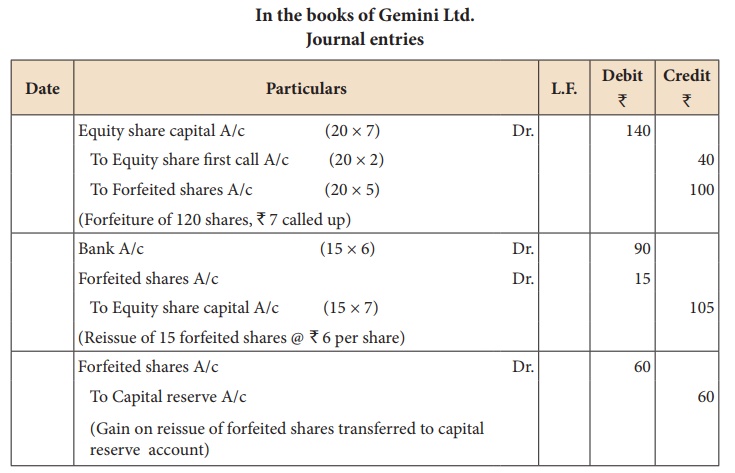
Note: Computation of transfer to
capital reserve
Forfeited amount for reissued shares
of 15 = 100/20 × 15 = 75
Less: Loss on reissue = 15
Transfer to capital reserve = 60
Remaining balance in shares forfeited account ₹ 25 will appear in the balance sheet.
Illustration 13
Jenifer Ltd. issued
10,000 equity shares of ₹
10 each at par payable on application ₹
3 per share, on allotment ₹
3 per share, on first call ₹
2 per share and on second and final call ₹
2 per share. The issue was fully subscribed and all the amounts were duly
received with the exception of 100 shares held by Subbu, who failed to pay the
second and final call. His shares were forfeited and reissued to Hema at ₹ 7 per share. Journalise
the above transactions.
Solution
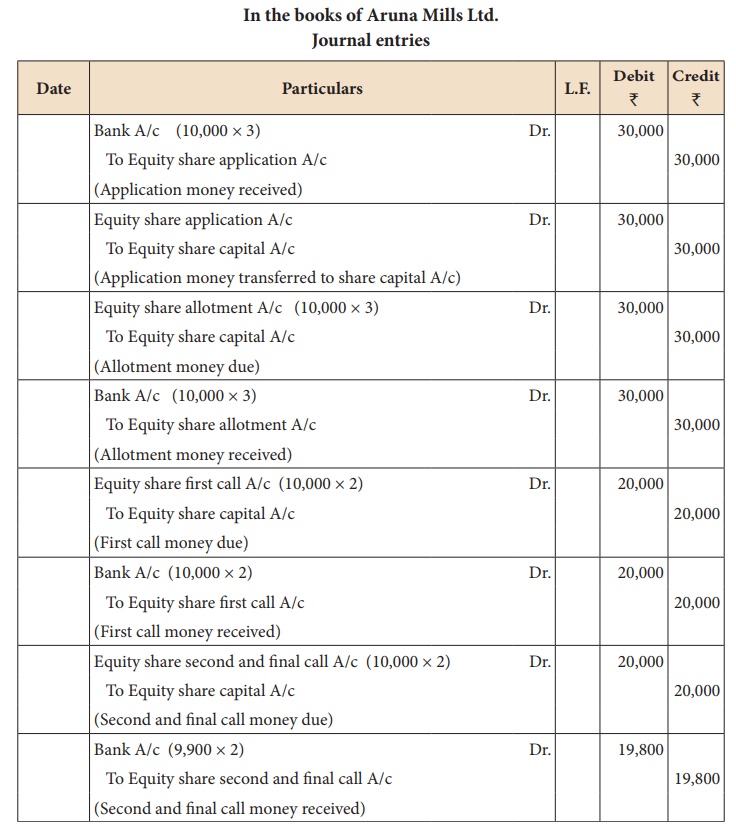
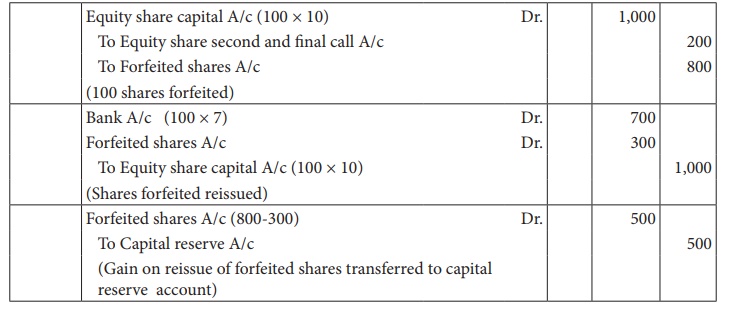
Illustration 14
X company issued 10,000
equity shares of ₹ 10 each payable as under:
On application ₹ 2
On allotment ₹ 4
On first call ₹ 2
On final call ₹ 2
Applications were
received for 30,000 shares. Applications for 10,000 shares were rejected and
allotment was made proportionately towards remaining applications and the
excess application money is adjusted towards allotment money. The directors
made both the calls and the all the amount were received except the final call
on 600 shares which were subsequently forfeited. Later 400 forfeited shares
were reissued as fully paid by receiving ₹
7 per share. Give journal entries.
Solution
In the books of X company
Journal entries
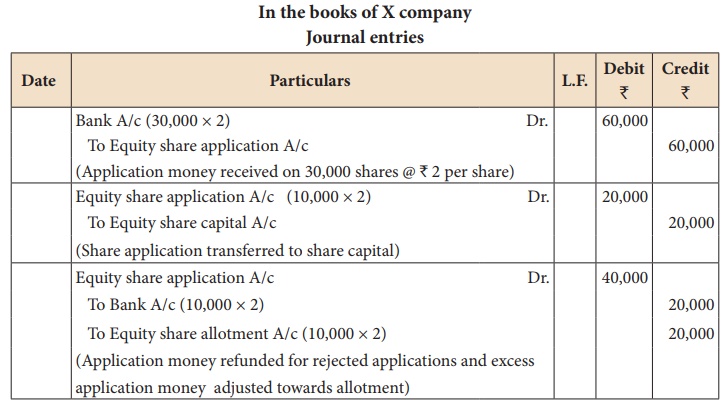
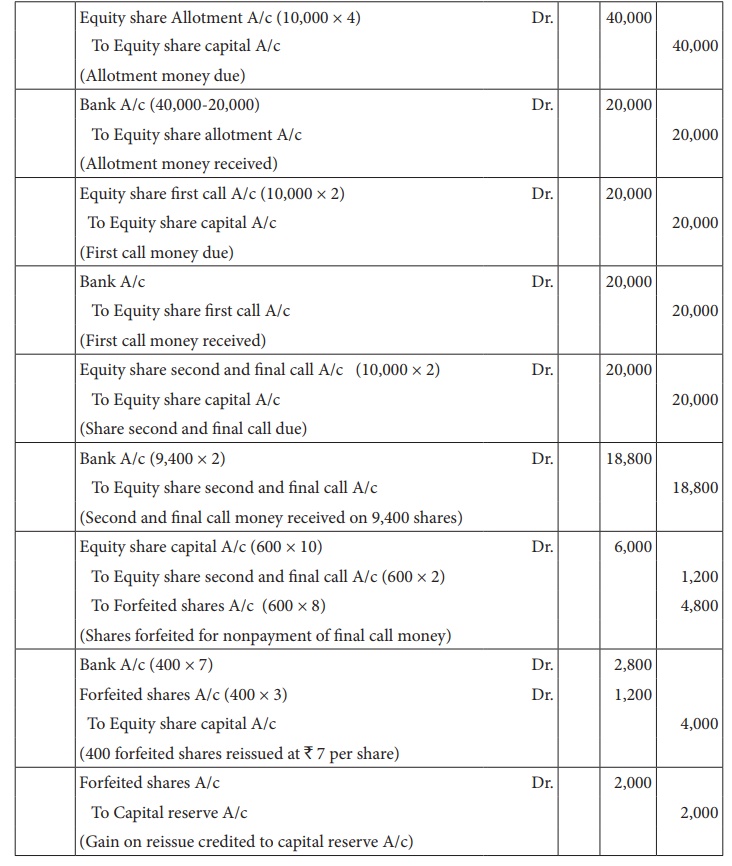
Working note:
Amount forfeited for 600 shares = ₹
4,800

7. Shares issued at premium
When a company issues
shares at a price more than the face value (nominal value), the shares are said
to be issued at premium. The excess is called as premium amount and is
transferred to securities premium account. The amount of securities premium may
be included in application money or allotment money or in a call. Securities
premium account is shown under reserves and surplus as a separate head in the
Note to Accounts to the balance sheet. Following are the journal entries for
recording securities premium:
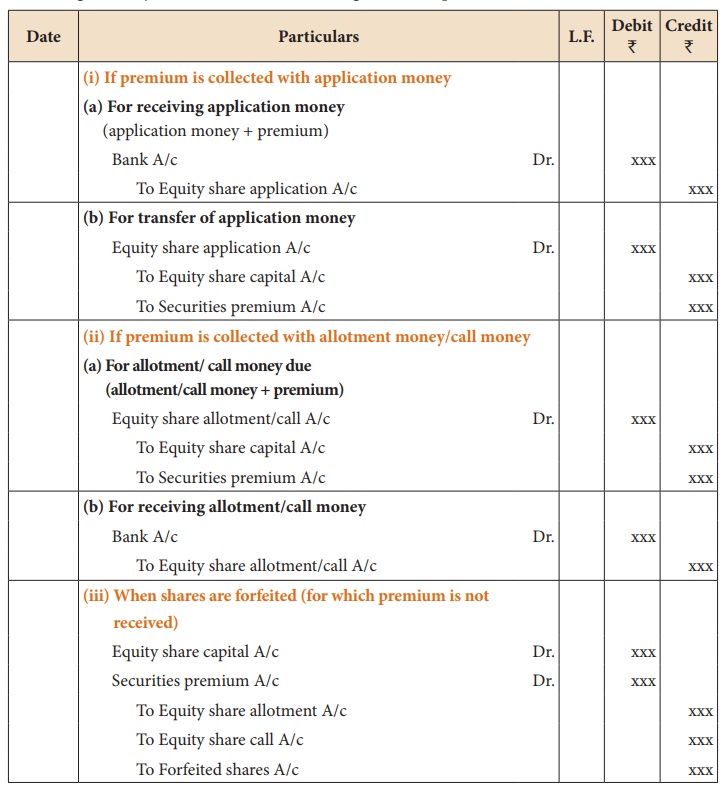
Tutorial note While forfeiting shares
for which premium had already been received, securities premium account should
not be debited.
Illustration 15
Shero Health Care Ltd.
invited applications for 3,00,000 equity shares of ₹ 10 each at a premium of
₹ 2 per share payable as
follows:
₹ 3 on application
₹ 5 (including premium) on
allotment
₹ 4 on first and final
call
There was over
subscription and applications were received for 4,00,000 shares and the excess
applications were rejected by the directors. All the money due were received.
Pass the journal entries.
Solution
Note: Number of shares
rejected = 4,00,000 - 3,00,000 = 1,00,000
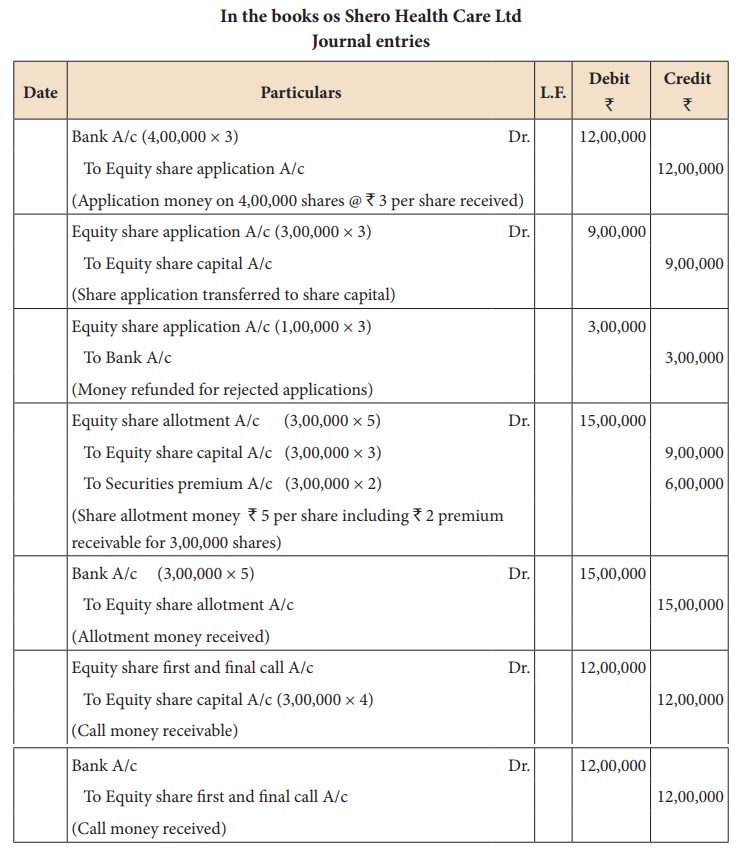
Illustration 16
Keerthiga Company issued
shares of ₹ 10 each at 10% premium,
payable ₹ 2 on application, ₹ 3 on allotment (including premium), ₹ 3 on first call and ₹ 3 on second and final
call. Journalise the transactions relating to forfeiture of shares for the
following situations:
(i) Mohan who holds 50
shares failed to pay the second and final call and his shares were forfeited.
(ii) Mohan who holds 50
shares failed to pay the allotment money, first call and second and final call
money and his shares were forfeited.
(iii) Mohan who holds 50
shares failed to pay the allotment money and first call and his shares were
forfeited after the first call.
Solution
In
the books of Keerthiga Company
Journal
entries
(i)
When final call money is not paid

Note: Since the premium amount is
received by the company, premium should not be cancelled.
(ii)
When allotment, first call money and second and final call money is not paid
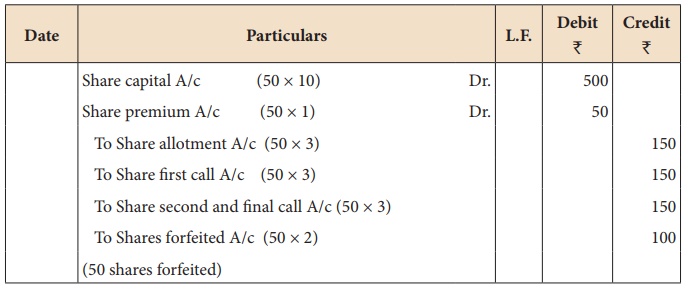
(iii)
When allotment and first call money is not paid

Illustration 17
Divya Ltd. allotted
10,000 equity shares of ₹
10 each at a premium of ₹
2 per share to applicants of 14,000 shares on a pro rata basis. The excess
application money will be adjusted towards allotment money. The amount payable
was ₹ 2 on application, ₹ 5 on allotment
(including premium of ₹
2 each) and ₹ 3 on first call and ₹ 2 on final call. Vikas,
a shareholder failed to pay the first call and final call on his 300 shares.
All the shares were forfeited and out of them 200 shares were reissued @ ₹ 9 per share. Pass the
necessary journal entries.
Solution
In the books of Divya Ltd.
Journal entries
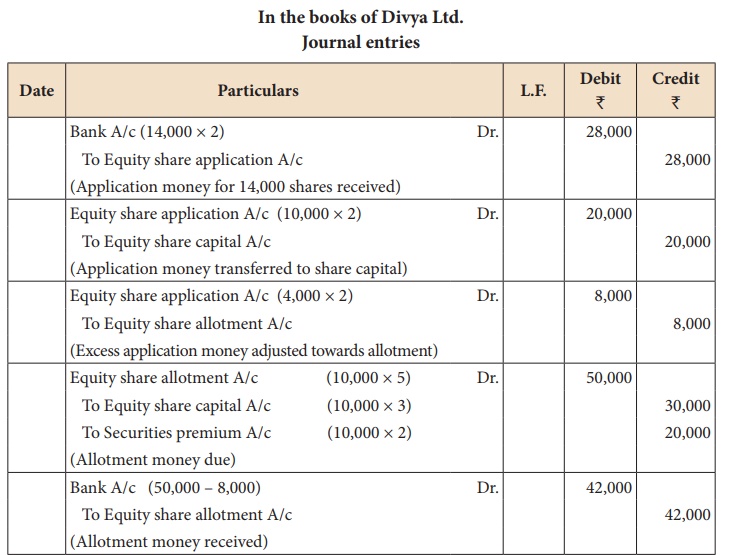
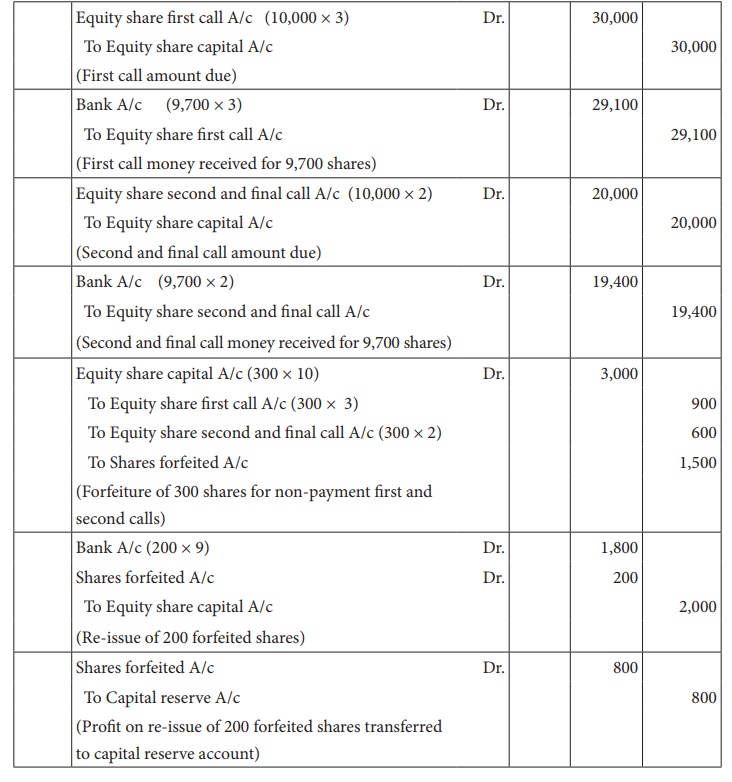
Working note:
Amount forfeited for 300 shares = ₹
1,500

Illustration 18
Thangam Ltd. issued
50,000 shares of ₹ 10 each at a premium of ₹ 2 per share payable as follows:
On application ₹ 5
On allotment ₹ 5 (including premium)
On first and final call ₹ 2
Issue was fully
subscribed and the amounts due were received except Priya to whom 500 shares
were allotted who failed to pay the allotment money and fist and final call
money. Her shares were forfeited. All the forfeited shares were reissued to
Devi at ₹ 8 per share. Pass
journal entries.
Solution
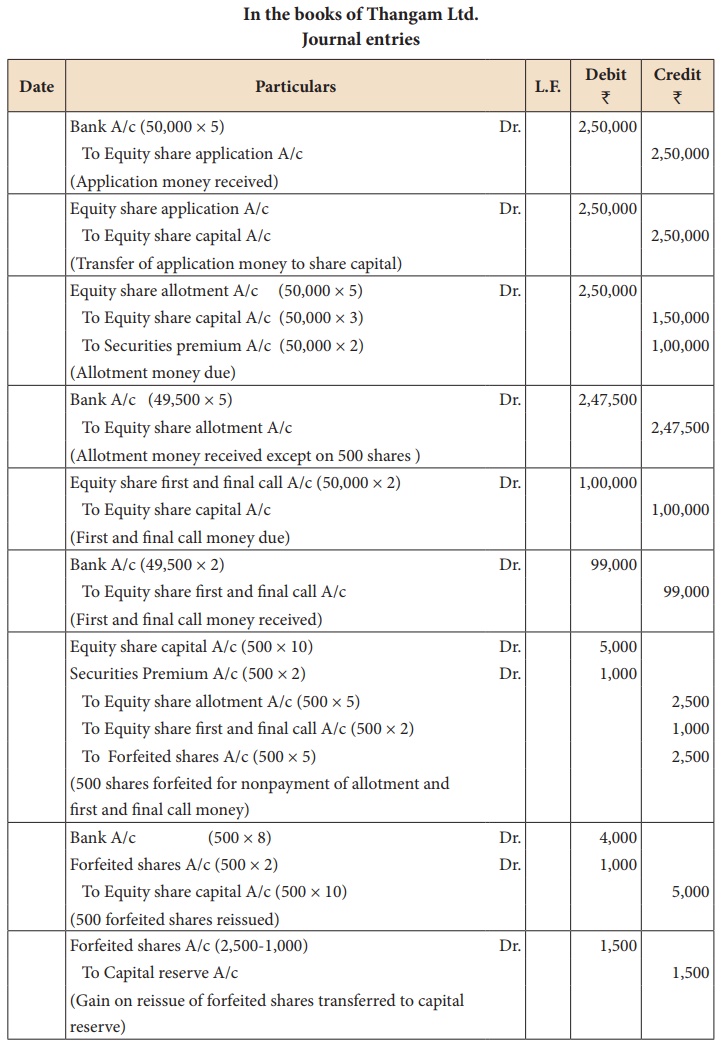
Related Topics